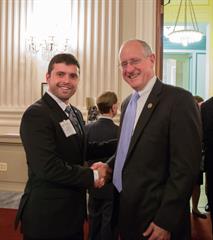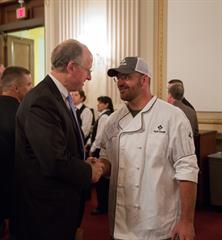|

|
|

|
|
Pictured: Chairman Conaway with Josh Eilers, founder of Ranger Cattle LLC in Austin, TX, and a U.S. Army veteran. As a Sergeant, Eilers served as team leader in the U.S. Army’s elite First Ranger Battalion.
|
|
Pictured: Chairman Conaway with Calvin Riggleman, a veteran, chef, farmer and the first producer in West Virginia to use the Homegrown By Heroes label.
|
Washington, D.C. - Yesterday, House Agriculture Committee Chairman K. Michael Conaway (R-TX) presented, in conjunction with Farm Credit and Ranking Member Collin Peterson (D-MN), an event to honor farmer veterans and celebrate the success of the Homegrown by Heroes program.
“Veterans’ contributions to our country go well beyond their actions on the field of battle,” said Chairman Conaway. “After they leave the military, they work in offices and in stores and on rigs and ranches. They start businesses and they teach our children in schools. The Homegrown By Heroes initiative supported by Farm Credit, helps veterans who are farming and ranching. We owe our veterans a debt that we can never repay. When we purchase products with the Homegrown By Heroes label, we are able to at least show our appreciation for the enormous sacrifices that they have made.”
Homegrown by Heroes is a product labeling program that identifies, promotes and supports agricultural products grown and raised by U.S. veterans and those still serving in any branch of the U.S. military. The program was launched nationally by the Farmer Veteran Coalition in 2014 with funding from Farm Credit. In the last year, the program has grown to include more than 165 farmers and ranchers across 43 states comprising $15 million in annual sales, with membership nearly doubling in the last three months.
The event featured an array of products produced by farmer veterans from across the country, highlighted by a signature grilled cheese sandwich by Calvin Riggleman, a veteran, chef, farmer and the first producer in West Virginia to use the Homegrown By Heroes label.
“As the first producer in West Virginia to use the Homegrown By Heroes label, I know first-hand how valuable this program is to my success,” said Riggleman. “I’ve been able to take my business to the next level with valuable advice that has helped strengthen my business, my numbers and my growth plan. I first envisioned my plans while I was in the Marine Corps in Iraq, advising my parents about planting, harvesting and selling from overseas. Since my return, I’ve worked with Farm Credit of the Virginias to expand my fruit operation to include a distillery. The support of Farm Credit and the Farmer Veteran Coalition has been a life-changer for me.”
The Farmer Veteran Coalition recognizes the commitment of rural Americans to military service with the goal of developing viable employment and meaningful careers through the collaboration of the farming and military communities. Veterans possess the unique skills and character needed to strengthen rural communities, and food production offers purpose, opportunity, and physical and psychological benefits to those veterans. At a time when Post-9/11 veterans are experiencing a 7.2 percent unemployment rate (compared to the national average of 5.4 percent), agriculture can be a meaningful solution for veterans returning home and looking to provide for their families. The Homegrown By Heroes label affords consumers the opportunity to thank a veteran for their service by purchasing their farm products.
“Farm Credit’s support of farmer veterans is a way for us to honor our nation’s farmer veterans with programs that will help get them on the path to success after returning home from serving our country,” said Gary Matteson, vice president of young, beginning and small farmer outreach for the Farm Credit Council and Board Member for the Farmer Veteran Coalition. “Farm Credit is committed to reaching out to returning veterans through veteran resource groups to highlight farming as an admirable, sustainable vocation, and serve them through lending programs and advisory services that support beginning farmers.”


